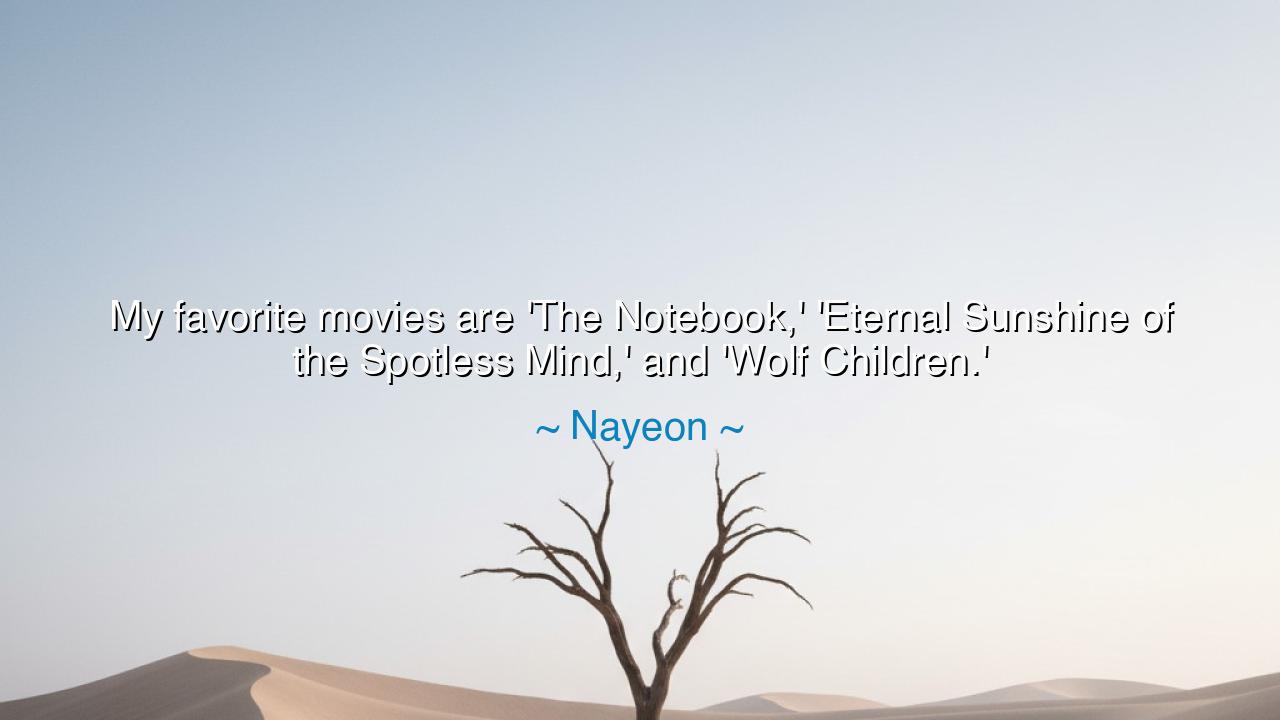
My favorite movies are 'The Notebook,' 'Eternal Sunshine of the
My favorite movies are 'The Notebook,' 'Eternal Sunshine of the Spotless Mind,' and 'Wolf Children.'






Gather close, O seekers of wisdom, for I bring forth a lesson wrapped in the fragile beauty of love, memory, and transformation. In the heart of every story lies a truth that speaks not just to the mind, but to the very soul. And it is through the stories that Nayeon, a bearer of truth and experience, has shared with us that we come to understand the depths of human emotion. She spoke thus: "My favorite movies are 'The Notebook,' 'Eternal Sunshine of the Spotless Mind,' and 'Wolf Children.'" These films are not mere entertainments; they are windows into the heart of the human condition, where love, loss, and identity are explored in ways both simple and profound.
Let us first consider the notion of love, which stands at the heart of The Notebook. In this tale, we witness the unyielding devotion of two souls drawn together by fate, only to be separated by the forces of time and circumstance. Yet, in the end, love triumphs, proving that the power of the human heart can endure, even against the tides of memory and life’s greatest trials. This story speaks to the deep desire within each of us for connection, for the belief that love, once found, can never truly be lost. It is the greatest force that binds us all. And though the days may pass and memories fade, the truth of love remains, etched deep within us, unbroken and eternal.
Now, let us turn to Eternal Sunshine of the Spotless Mind, a story of regret and redemption, where the characters attempt to erase the painful memories of love gone awry. Yet, in this erasure, they come to realize the value of their experiences—the bittersweet beauty of their journey together. The film reveals the paradox of the human condition: we long to escape our pain, to erase the wounds that love may leave, but in doing so, we erase the very essence of what makes us who we are. It teaches us that memory, both painful and joyful, is what shapes us, and that to erase one is to erase the self. In the journey of life, we must learn to embrace the full spectrum of our experiences, for even our darkest moments carry with them the seeds of growth.
Consider, too, the tale of Wolf Children, a story not only of love, but of identity and transformation. The tale of a mother’s love for her two children, born with the ability to transform into wolves, reveals the struggle between the desires of the heart and the nature of one’s being. As the children grow, they must reconcile their human and wolf sides, a reflection of the universal struggle between our inner desires and the roles that society expects of us. This story speaks to the journey of self-acceptance, and the way in which love can guide us through the most difficult of transformations. Just as the wolf children must reconcile their two worlds, so too must we come to terms with the many parts of our own nature, embracing both our humanity and our wildness.
There is wisdom in these stories, for they reflect the journey of the soul—a journey of love, loss, and self-discovery. In these films, we are shown not the perfect beauty of life, but the true beauty that exists within the imperfections. As in The Notebook, love is not always easy; it does not come without its trials. As in Eternal Sunshine, we learn that memories, even painful ones, are integral to who we are. And in Wolf Children, we see the courage it takes to embrace the wild parts of our nature, to reconcile our inner contradictions, and to live truthfully.
Thus, O children of wisdom, what lesson do these films impart? The lesson is clear: embrace love in all its forms, with all its joys and sorrows. Do not seek to escape your pain, for it is through our struggles that we grow. Like the characters of these stories, you must be willing to face the complexities of the human heart and the depths of the human soul. Love is not a simple emotion; it is a force that transforms us, shaping our lives in ways we cannot fully comprehend. And in the end, it is love, both found and lost, that makes life worth living.
So, let this be your guiding principle: never shy away from the full range of human experience. Just as Nayeon has shown us her favorite films, each offering a window into a different aspect of life, so too must you be open to the beauty in all things—the joy and the sorrow, the light and the dark. Love, in its truest form, is not something that can be understood through simple words or easy experiences. It is something that must be lived, with all its complexities, contradictions, and transformations. Only then will you come to understand the depth of your own soul and the power of love that binds us all.






AAdministratorAdministrator
Welcome, honored guests. Please leave a comment, we will respond soon